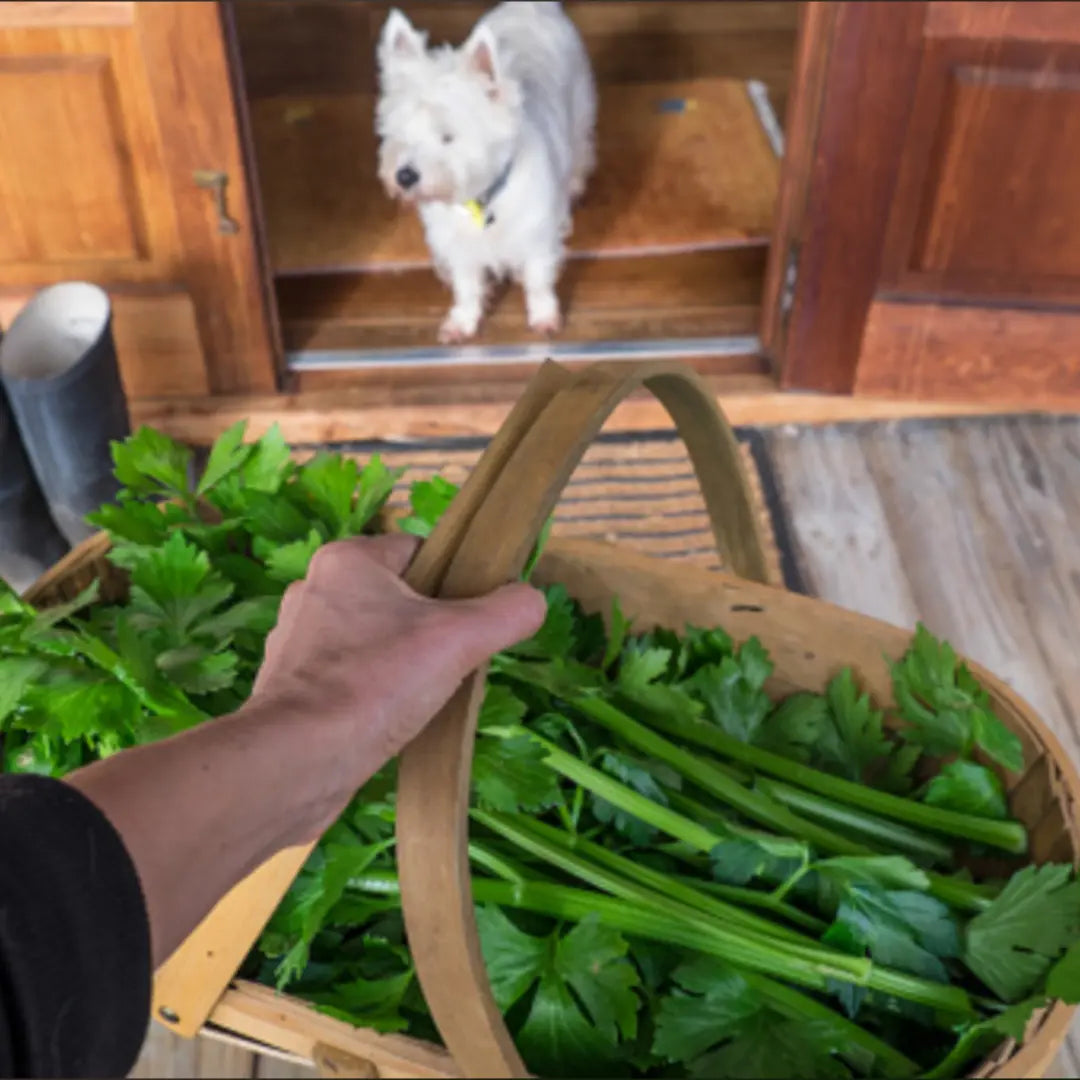Is Celery Good for Dogs?
Celery is a popular vegetable that is known for its crunchy and fibrous texture. It’s a great low-calorie snack for humans, but what about our pups? As a dog parent, you may have wondered if your dog can safely munch on this green veggie. The answer is yes, but there are some important things you should be aware of. In this article, we’ll explore the benefits and dangers of feeding celery to dogs.
Benefits of Celery for Dogs
Celery is a great source of vitamins and minerals that are essential for your dog’s health. It's full of potassium, vitamins, and antioxidants. These include vitamin K, vitamin A, and vitamin C. It also has a high fiber content, which can help regulate your dog's digestive system. Additionally, celery has a high water content, which is great for hydration. For senior dogs or dogs with kidney issues, eating celery can be a great way to keep them hydrated and supplement their diet with additional nutrients.
Here are other health benefits of celery for dogs:
1) Can Help Lower Blood Pressure
High blood pressure is as much of a problem for dogs as it is for humans. A dog's blood pressure can spike due to stress, illness, or aging. However, celery is a dietary solution that can help regulate blood pressure levels in canines. The reason behind this is the vegetable's high potassium content, which helps offset excess sodium in the body.
2) Improves Joint Health
Just like osteoarthritis is common among humans, it's a prevalent condition among older dogs too. Celery has a high amount of antioxidants like flavonoids and vitamin C, which reduce inflammation and improve bone and joint health. This vegetable can help dogs suffering from joint issues get back to their regular activities and feel healthier.
When it comes to supporting joint health through nutrition, even in animals like horses, tailored care is essential. As Jennifer Gilliland, founder of Mojo Joint, explains, “When it comes to horses, clarity in care starts with understanding their specific joint and nutritional needs—because what works for one may not work for another.” This same principle can apply to dogs, reinforcing the importance of individualizing their diet and supplementation for joint support.
3) High Fiber Content
Like humans, dogs need fiber for proper digestion. Celery is an excellent source of dietary fiber, which can help regulate bowel movements. If your dog is having digestive issues like constipation, adding celery to their diet might help.
4) Freshens Breath
Bad breath in dogs is a prevalent issue that arises due to the build-up of bacteria in the mouth. When a dog eats celery, the crunchy texture of it can help get rid of some of the build-up that causes bad breath. Celery has natural properties that can help clean a dog's teeth and freshen up your dog’s breath. A bonus is the low-calorie content that makes it a great snack for dogs with obesity or who have issues with weight loss.
5) Lowers Cholesterol Levels
Cholesterol is an essential fatty acid that provides the body with energy, but too much cholesterol in the body can lead to heart disease in dogs. Celery is an excellent source of antioxidants that can effectively lower cholesterol levels in the body. Adding celery to a dog's diet can potentially improve heart health and overall well-being.
Dangers of Celery for Dogs
While celery is generally safe for dogs, there are some things to watch out for. First, it’s important to cut celery into small pieces to prevent choking hazards. This is especially important for small dogs or dogs with dental issues. Additionally, while celery is not toxic to dogs, it can cause an upset stomach if consumed in excessive amounts. Some dogs may also have allergic reactions to celery, so it’s important to observe your dog for any signs of discomfort or illness after consuming it.
How to Feed Celery to Your Dog
If you want to feed celery to your dog, start with small amounts and gradually increase the quantity. Celery can be given as a snack or mix a couple of pieces of celery into your dog’s food. Be sure to wash the celery thoroughly before feeding it to your dog to remove any dirt or pesticides. As mentioned earlier, it’s important to cut the celery into small pieces to prevent choking hazards. If your dog has never tried celery before, it’s also a good idea to monitor them for signs of digestive upset.
Can Dogs Eat Celery Stalks or Celery Sticks?
The answer to this question is a resounding yes! Celery stalks and celery sticks are safe for dogs to eat, and they even provide some nutritional benefits. Celery is high in fiber, vitamins A, C, and K, and potassium. However, celery should always be given to dogs in moderation, as too much fiber can cause digestive issues. Additionally, make sure to cut celery into small pieces to avoid choking hazards.
Can Dogs Eat Celery Leaves?
While celery leaves are not toxic to dogs, they are not recommended as a treat either. Celery leaves are more difficult to digest than the celery stalk, and they can cause stomach upset or diarrhea in some dogs. Additionally, celery leaves contain higher levels of oxalic acid, which can cause kidney damage in large quantities. To be on the safe side, stick with giving your dog celery stalks or sticks instead of leaves.
Can Dogs Eat Cooked Celery?
Cooked celery is safe for dogs to eat, but some of the nutrients can be lost during the cooking process. Additionally, flavored or seasoned celery can contain ingredients that are harmful to dogs, such as garlic, onion powder, or xylitol. If you decide to feed your dog cooked celery, make sure it is plain and unseasoned.
Can Dogs Eat Raw Celery?
Raw celery is perfectly safe for dogs to eat, as long as it is given in moderation. Chopped celery has a crunchy texture that dogs enjoy while eating raw celery. It's important to note that some dogs may have trouble digesting raw vegetables, so it's always a good idea to start with small amounts and monitor your dog's reaction. Additionally, be sure to cut celery into small pieces to avoid choking hazards.
Fun Ways to Incorporate Celery into Your Dog’s Diet
If you want to add celery to your dog’s diet in a fun and tasty way, try making homemade frozen healthy treats, like our Dog Celery and Watermelon Cubes. Simply blend celery and watermelon with water and freeze it in ice cube trays. You can also mix celery with other dog-friendly fruits and veggies like apples, bananas, or carrots for a healthy snack. Another option is to make a dog-friendly “ants on a log” by stuffing celery with peanut butter or cottage cheese and adding other fruits or veggies on top for a delicious and nutritious treat. Just make sure to cut the celery into bite-sized pieces before serving.
Conclusion
In conclusion, celery is one “human food” that can be a great addition to your dog’s diet when fed in moderation and with caution. It’s a great source of vitamins, antioxidants, and fiber that can benefit your dog’s overall health. However, it’s important to watch out for choking hazards and potential digestive upset. As always, monitor your dog’s reaction when introducing new food to their diet. With these tips in mind, you and your pup can safely enjoy the many benefits of celery together!



